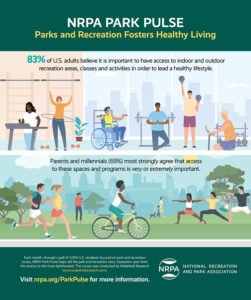
Image by Rawpixel.com, Shutterstock
Five in six U.S. adults agree that access to indoor and outdoor recreation is vital to lead a healthy lifestyle, according to a National Recreation and Park Association Park Pulse poll.
Ensuring community members have access to recreation areas, classes and activities is a key focus for park and recreation professionals. The 2023 NRPA Agency Performance Review shows 81 percent of park and recreation agencies offer fitness classes, and 80 percent offer health and wellness education. Additionally, findings show there is one park for every 2,287 people in the United States.
Among other key findings:
- 83 percent of U.S. adults agree it is important to have access to indoor and outdoor recreational areas, classes and activities in order to lead a healthy lifestyle.
- Two-thirds of U.S. adults living in the west say it is very or extremely important to have access to indoor and outdoor recreational areas, classes and activities in order to lead a healthy lifestyle.
- 69 percent of millennials and parents believe it is very or extremely important to have access to indoor and outdoor recreational areas, classes and activities in order to lead a healthy lifestyle.

“Park and recreation professionals know parks make people and communities healthier,” said Kevin Roth, NRPA vice president of research, evaluation and technology. “Physical health usually comes to mind when considering the health benefits of parks, but parks also contribute to mental, social and environmental health.”
Parks promote greater well-being across four domains of health: physical, mental, social and environmental. Greater physical activity, access to green spaces, and services and programming that promote better health outcomes lead to less reliance on medication, fewer trips to the hospital, and lower healthcare costs. NRPA, not-for-profit organization dedicated to building strong, vibrant and resilient communities through the power of parks and recreation, partnered with the Urban Institute to develop resources that help park and recreation professionals and advocates make a health-based case for parks, including measures of the economic value to those health benefits.
 Your Privacy Choices
Your Privacy Choices